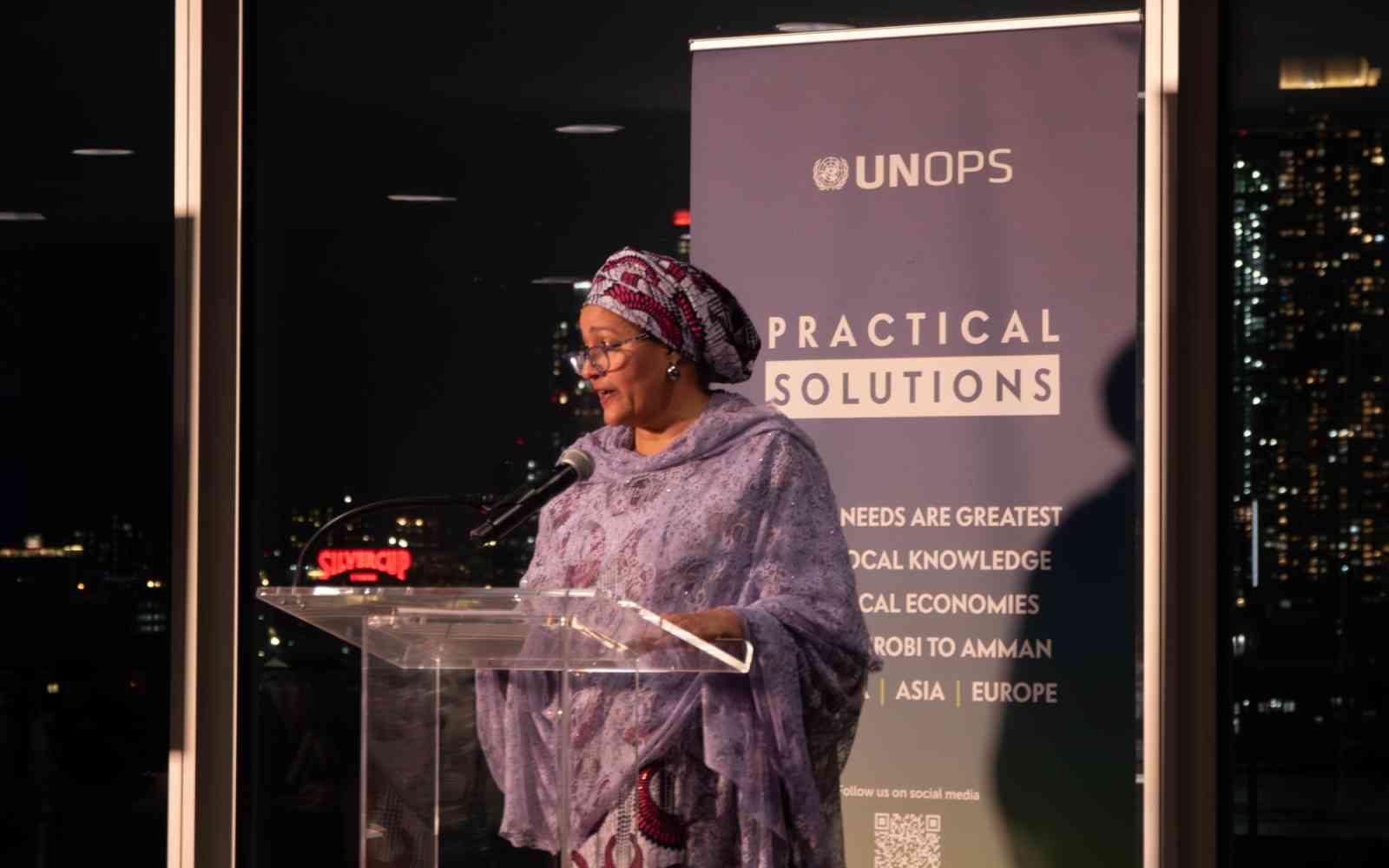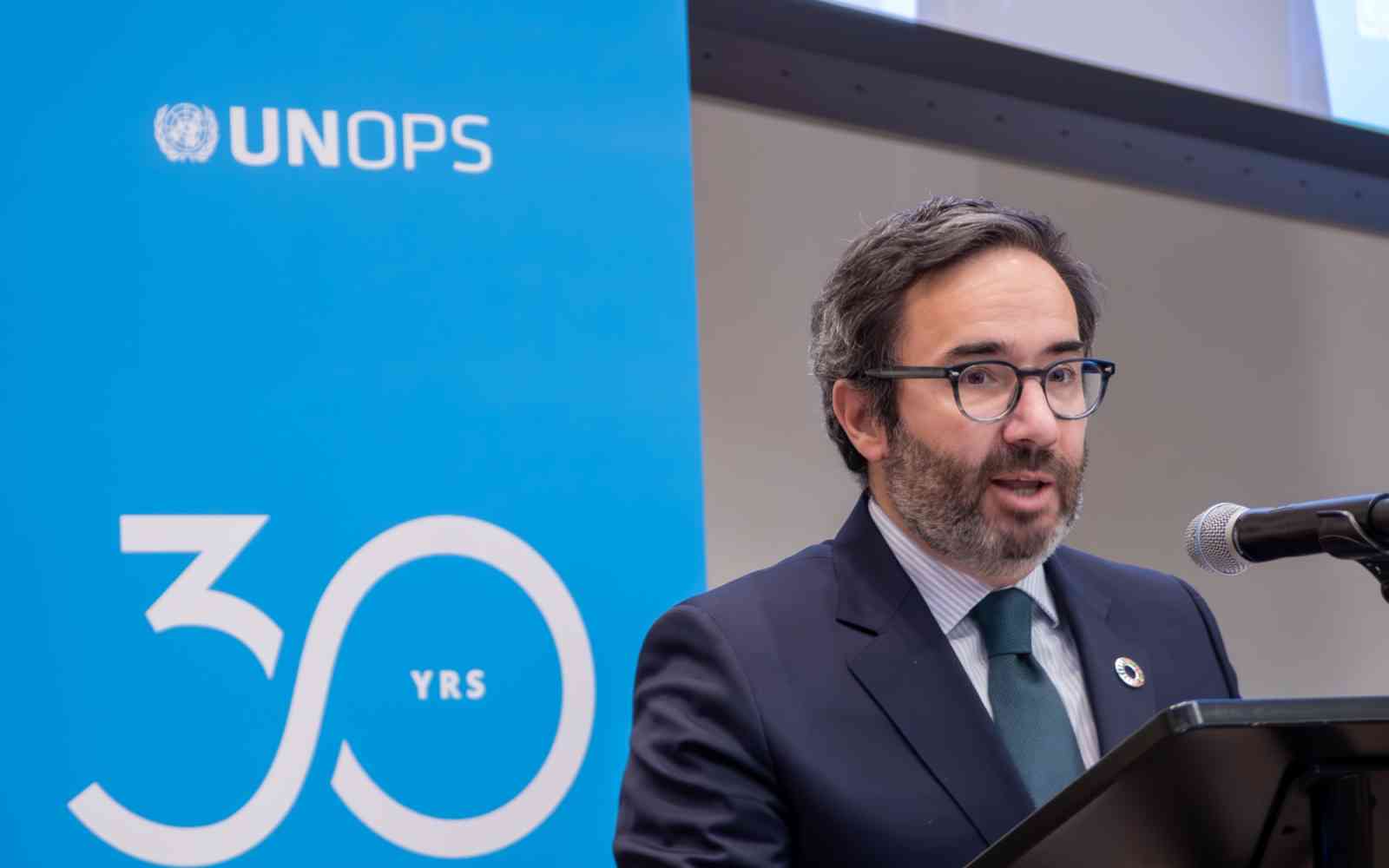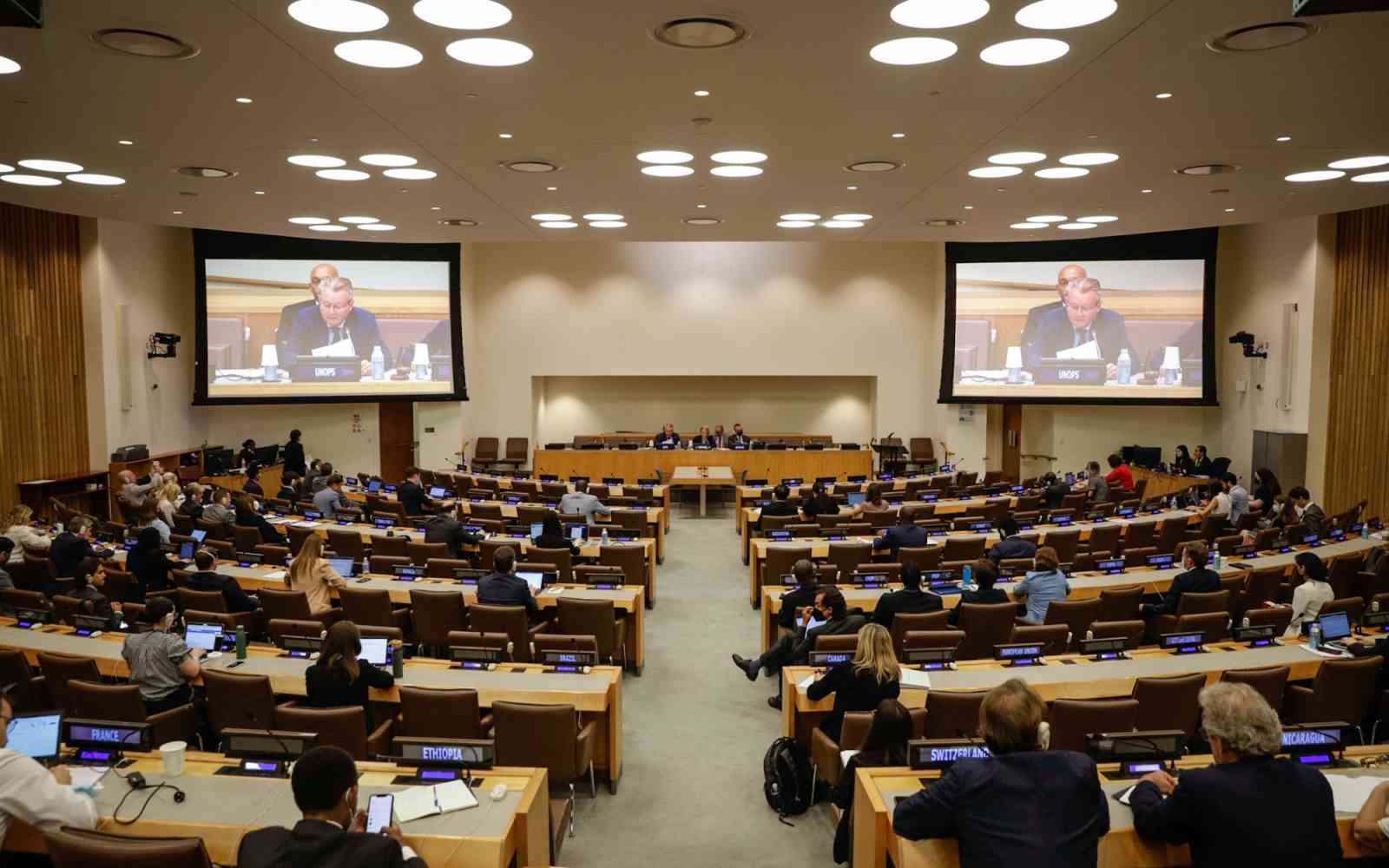The United Nations Office for Project Services (UNOPS)
Declaración durante el primer período ordinario de sesiones de la Junta Ejecutiva de 2020
[Check against delivery]
Thank you Mr President.
The Deputy Secretary-General’s words, which we just heard, on the occasion of UNOPS 25th anniversary are heartwarming indeed.
I want to take a moment today to acknowledge all the thousands of men and women who over the years have worked so hard to make our services a force for good in this world.
UNOPS at 25 is in good shape. We have increased our delivery, in quantity and quality. And while we don’t like to gloat over it, we feel rewarded when those who use our services return for more.
I would like to extend a warm welcome to the new members of the Executive Board. And I congratulate our new President, His Excellency Ambassador Walton Webson of Antigua and Barbuda, as well as our distinguished vice presidents.
UN reforms
Over the past 25 years, following the guidance of our Board, UNOPS has grown into a mature, confident and robust organization. Early results from 2019 financial close indicate a solid performance once more.
We are, consequently, an effective, efficient, and truly dynamic organization, very well-placed to be a driving force towards reaching the SDGs. And based on our experience, our working methods and performance, we are also well-suited to help transform and reform the UN development system.
We work in close coordination with the UN Sustainable Development Group (UNSDG), under the leadership of the DSG and with the support of the UN Development Coordination Office (DCO).
Mr. President, in your opening remarks to the Board on Monday, you emphasized, and I quote: “This year will once again call us to be perceptive, to be nimble, to be focused and to be innovative as we engage in critical issues such as the mid-term review of the strategic plans.” End quote.
With your support, and under your guidance, UNOPS business model is well placed to support the UN’s reform journey.
We implement projects on behalf of UN organizations, governments and other partners. We support partners seeking to enhance their own capacity. These efforts can and should be system-wide. As a project-based organization with no core funding, we have to be cost-efficient. We bring effective solutions to partners. And we are constantly on the look-out for new and more effective technology and innovation.
Stronger collaboration is key: we fully support the new Resident Coordinator system, and are active members of the United Nations Country Teams. The latter is essential, also in countries where we do not have a permanent physical presence.
We work hard to be a preferred partner for Member States as well as UN colleagues.
I don’t want to hide the challenge to convince our UN partners to collaborate in a shrinking resources market. They tend to want to keep funds internally. One serious risk here is it leads to duplication, and we cannot defend or sustain that in today's world where everybody in the business is avoiding duplication.
Our business model is different from other UN agencies and we benefit from sharing. We don't have country programmes - and are often a non-resident agency. Instead, we operate a hub structure, which allows us to be more agile: starting up and closing down operations as needs arise.
Our shared service model has allowed us to maximize our resources. And we stand ready to provide support to UN-wide business operation processes through our shared service centres. This is perhaps the most obvious low-hanging fruit when all agencies have to find and implement efficiency gains.
I am also increasingly involved on a personal level.
Last year I accepted the Secretary-General’s nomination to chair the High-Level Committee on Management (HLCM) and help guide the UN’s efforts to become more efficient and simplify business practices. Some of the activities that have thus far been directly within the reform structures are now moving under the HLCM for implementation, and I will ensure that the same rigor that I apply within UNOPS to drive cost efficiency and effectiveness will also be applied to the HLCM work.
But our support for reforms extends beyond this, and involves us working to enhance national capacity to achieve the SDGs.
S3i
In the course of the last year, we have increasingly been approached to build on the concept and unique business model of our 'S3i' initiative. And truly, implementing the 2030 Agenda requires innovative financing solutions.
Our S3i initiative features prominently in the SGs Financing for Development Strategy. From its earliest stages, the Board has guided our work in social impact investing.
With your strong and continued support we have been able to develop our S3i initiative into what is now a significant model for channelling private sector investment towards developing countries and helping meet critical national needs within affordable housing and renewable energy.
Again with the Board’s support and our ability to utilize a portion of our reserves to demonstrate our commitment by investing directly ourselves, we are making a difference. We will be discussing the use of the reserves at the Annual Session in June.
In recognition of the evolution of S3i, we have adjusted its name to Sustainable Infrastructure Impact Investments which better reflects the essence and the goals of the initiative.
We have now reached a new milestone with the S3i. And I would like to use this opportunity to sincerely thank the Government of Finland, who have kindly offered to host our S3i Office in Helsinki. Our new office in Helsinki will commence its operations, in a phased approach, from 1 March.
Our towering S3i commitment to help build more than 860,000 homes over the next decade, in Kenya, Ghana, India, Pakistan and across the Caribbean, makes a tangible difference in people’s lives.
In Kenya, the first of 100,000 planned homes has been built, in a scheme that – to quote President Uhuru Kenyatta - “addresses the lack of access to affordable and accessible financing for ordinary Kenyans who want to own an affordable home.”
In Antigua and Barbuda, Prime Minister Gaston Browne recently said his government “fully endorsed” our work on affordable housing. He said - and I quote - “it will bring foreign direct investment that will create jobs.”
We continue our work with government partners to reduce the cost of mortgages, so that people on low and middle income can buy their first home.
Quality Infrastructure
And now, a word on how UNOPS uses its expertise in quality infrastructure, to support governments ensure long-term, sustainable and resilient development.
Our expertise in quality infrastructure forms a key part of our mandate and a stepping stone to S3i. We helped shape the G20 principles for quality infrastructure investment last year. And through our work with the Global Commission on Adaptation, we look to support governments find innovative ways to adapt to and tackle the climate crisis.
We are committed to helping governments establish a vision for their future infrastructure, that is aligned with the SDGs, and with the Paris Agreement on climate change.
To give you an example, the government of St Lucia recently endorsed an infrastructure assessment that UNOPS carried out together with the University of Oxford. It estimates St Lucia’s future infrastructure needs, and makes recommendations on how they can be met in a way that responds both to national priorities and international development commitments.
Infrastructure is at the heart of sustainable development. Estimates suggest over $90 trillion dollars of global infrastructure investment will be required by 2040, to support sustainable development. This global demand for infrastructure is unprecedented.
The infrastructure we are building must be ready for the needs of the future! It must be fit to withstand and adapt to a changing climate. It must be resilient, sustainable and inclusive. And importantly, it must be affordable – so the poorest, who tend to be the worst hit, are not left behind.
I believe if we are innovative enough, we can respond effectively to those challenges. Let me give you an example.
In the last weeks of 2019, lights were switched on for the first time in 54 rural communities in Sierra Leone. This is a country where access to affordable electricity and health services remain a huge problem. Their journey from candles and batteries to affordable electricity, involved some thinking outside the box. It involved using health centers as power stations.
Funded by the UK government, we first started work to improve access to health in rural areas. We helped set up solar power in community health centres. Next we built mini-grids to provide power to the whole community.
For this to be sustainable, addressing the long-term operation and maintenance of the mini-grid system, was a critical factor. National resources are limited in Sierra Leone. And this is where the private sector needed to get involved.
Today, we are engaging private operators to take on this responsibility, and at the same time, to realize a profit for their contribution, and to co-invest in the development of a further 45 mini-grids across the country.
In the words of Sierra Leone’s President Julius Maada Bio, this project “helps support small-scale enterprises by stimulating economic activities and will also help agricultural activities.”
For the 360,000 residents, local businesses and essential services that benefit from this ...
- It means better employment opportunities
- It means better access to health
- It means better access to education
- It means less greenhouse gas emissions
- And it means more opportunities, also for women
Gender
25 years since the Beijing Platform for Action Declaration, no country has achieved gender equality.
At UNOPS, we put gender equality at the centre of all our work. Through our mandate in infrastructure and procurement, our projects have huge potential to create new opportunities for women and girls.
Effective procurement, for example, can hugely impact gender equality. It can influence the supply chain in supporting women-led businesses or prioritize suppliers with better gender parity results. It can push for gender-sensitive requirements, to better ensure equitable benefits from the goods or services supplied.
Similarly, gender-conscious infrastructure can offer women many opportunities for a better life ...
- By improving their access to health, education and jobs
- By allowing them the time to empower themselves
- And by providing livelihoods as part of the infrastructure projects.
From Afghanistan to The Gambia, UNOPS uses infrastructure as an avenue to provide women with vital jobs and opportunities for growth, while challenging gender stereotypes that see the sector as the domain of men.
---
Focus on gender, has been a key component of the UN reforms – and a key priority for UNOPS, as I have previously reported to this Board.
Last year in this room, I confirmed that over the course of 2018, we had failed in our initial attempts to address gender concerns at UNOPS, when I reported an overall gender balance of 39 per cent women. Twelve months later, women now represent 43 per cent of UNOPS personnel.
This has not been simple. It has taken dedication and commitment. But our job is far from over, and we are determined to do better. And our targets remain ambitious: to reach the fringes of gender parity - 47 per cent - by the end of 2020.
We have made some significant decisions in approaching this challenge at UNOPS. Perhaps most importantly, we made a commitment to go beyond UN staff targets. At UNOPS we include all of our personnel (irrespective of contract types) in our gender targets. Today’s 43 per cent cover all UNOPS personnel, be they consultants, contractors, or staff.
We encourage other members of the UN family to do the same.
Next steps
As we move into 2020, a primary focus for UNOPS will be the mid-term review of our strategic plan. That plan resulted in us becoming better-known, and recognized as a valuable resource to help our partners deliver on the SDGs. But time is now ripe to take stock of the changing global context, and to review our strategy to see how we can better our offering to our partners.
Last year, under the direction of the Secretary-General, a Client Board was established, to provide an opportunity for our key partners to provide feedback, following our traditional partner survey. This Client Board will be in place and have its first meeting later this month. This will also bring new voices and opinions to the table. I will be updating you on this meeting in June, and we will incorporate the outcomes of the meeting into the mid-term review process, in order to inform your decisions.
Conclusion
I want to conclude with words from the 19th-century women’s rights activist Lucretia Mott:
“If our principles are right, why should we be cowards?”
From the long road ahead on gender equality, to our fight against climate change and poverty, the future can seem uncertain. But the solutions to our biggest challenges do exist. We just need to work harder, and better together, to do the right thing.
Thank you.












